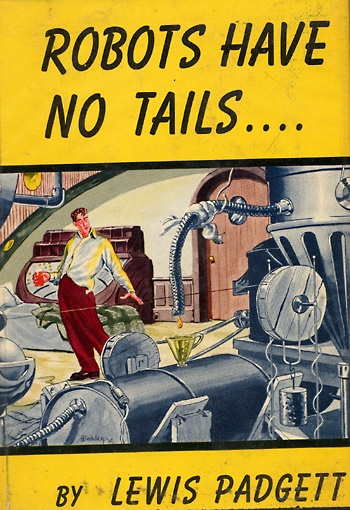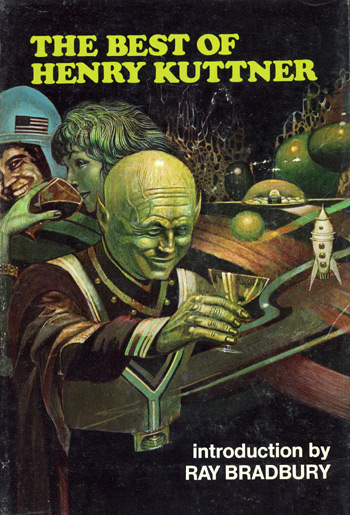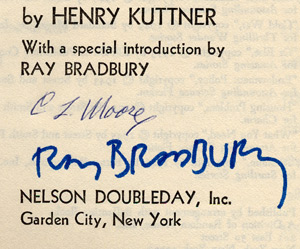I have been hunting for Henry Kuttner’s autograph for a very long time. Henry Kuttner is one of my favorite sci-fi writers of all time (see my article about Kuttner). Kuttner died early and his signatures are very rare, fetching upward of $500. I keep a request for a book signed by Kuttner in hope that some ignorant bookseller might sell a signed copy cheaply. A few days ago abebooks wishlist emailed me a really weird item:
“henry kuttner
His personal baby book
his very first book starts on april 7th 1915 and includes his first photograph, mother’s as well as his nurses’ signature, and documents his first 3 words (please nobody take offense) nigger, nigger, nigger. It was in the possesion of author C.L. Moore but now it could be y
ISBN:
Bookseller Inventory #22224
Price: US$ 2500.00 “
I hope nothing bad happened to Kuttner’s wife and co-author, C.L. Moore. Why would a thing like that end up on the market?
Now, that’s a rather weird choice of first words for a baby. But the year being 1915 and everything, my guess is that little Henry must have been rather fond of the nursery rhyme that Agatha Christie used for her whodunit masterwork. Here’s a write-up from Rosetta Books, and eBook publisher:
.. A note about the title — Christie originally called the novel Ten Little Niggers, a reference to an old nursery rhyme that she places, framed, in the guest rooms of the ten characters in the story. Each dies in the manner described in a verse of the sing-song rhyme — e.g., “Ten little nigger boys went out to dine; One choked his little self and then there nine.” The rhyme ends with the words, “… and then there were none.” The offensive word, which carries an extra dimension of ugliness in American culture, was replaced with “Indians” for American publication. Ironically, “Indian” is now also a politically incorrect term, so the novel has officially been retitled And Then There None. As Charles Osborne points out in his delightful and indispensable study The Life and Crimes of Agatha Christie, the shift in the old American title creates a bit of confusion. For Americans think it refers to another nursery rhyme that begins, “One little, two little, three little Indians …” The nature of the original title reflects the time in which the novel it was written and the world in which Christie became an adult and a writer, one shaped largely by the British Empire and the racist thinking of the past. The cosmetic change of title to And Then There Were None is merely that, however. It erases a troubling shadow from an extraordinary, hugely entertaining achievement.
Some somewhat related links:
Straight Dope : In whodunits, it’s “the butler did it.” Who did it first?
A complaint to Canadian Broadcast Standards Council :
This case is, in the experience of the CBSC, unique; it marks the first occasion on which a Regional Council has been asked to review the title, as opposed to the content, of a television program. The broadcast in question is a cooking show entitled Gwai Lo Cooking which is aired by CFMT-TV (Toronto). The source of the complaint is the historic Cantonese expression “gwai lo” which is used as a material component of the show’s title. In its etymological background, “gwai lo” translates as “foreign devil” or “ghostly fellow” and it continues to be used by some Chinese to refer to “pale-skinned” Westerners. In the context of the title in question, “gwai lo” refers to the show’s host, who, although of Caucasian, rather than Oriental, much less Chinese, descent, speaks Cantonese and is able to offer North Amercian and European cooking recipes to the Cantonese-speaking Chinese Canadian community. …



